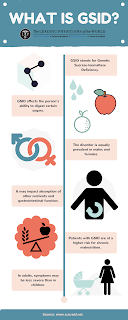Genetic Sucrase-Isomaltase Deficiency
Congenitalsucrase-isomaltase deficiency is a disorder that affects a person's
ability to digest certain sugars. People with this condition cannot break down
the sugars sucrose and maltose. Sucrose (a sugar found in fruits, and also
known as table sugar) and maltose (the sugar found in grains) are called
disaccharides because they are made of two simple sugars. Disaccharides are
broken down into simple sugars during digestion. Sucrose is broken down into
glucose and another simple sugar called fructose, and maltose is broken down
into two glucose molecules. People with congenital sucrase-isomaltase
deficiency cannot break down the sugars sucrose and maltose, and other
compounds made from these sugar molecules (carbohydrates).
Congenital
sucrase-isomaltase deficiency usually becomes apparent after an infant is
weaned and starts to consume fruits, juices, and grains. After ingestion of
sucrose or maltose, an affected child will typically experience stomach cramps,
bloating, excess gas production, and diarrhea. These digestive problems can lead
to failure to gain weight and grow at the expected rate (failure to thrive) and
malnutrition. Most affected children are better able to tolerate sucrose and
maltose as they get older.
The
prevalence of congenital sucrase-isomaltase deficiency is estimated
to be 1 in 5,000 people of European descent. This condition is much more
prevalent in the native populations of Greenland, Alaska, and Canada, where as
many as 1 in 20 people may be affected.
Symptoms
Congenital
sucrase-isomaltase deficiency usually becomes apparent after an infant is
weaned and starts to consume fruits, juices, and grains and often is diagnosed
under the age of 18 months. It may sometimes be diagnosed in older children or
adults, however the frequency of CSID in adults has not yet been determined.
After
ingestion of sucrose or maltose, an affected person will typically experience
watery diarrhea, bloating, excess gas production, abdominal pain ("stomach
ache"), and malabsorption of other nutrients. Other symptoms may include
nausea, vomiting, or reflux-like symptoms.
In some
children, these digestive problems can lead to failure to gain weight and grow
at the expected rate (failure to thrive) and malnutrition. Most affected
children are better able to tolerate sucrose and maltose as they get older.
Symptoms
can vary for a variety of reasons including the timing of introduction of
sucrose into a person's diet, and the amount of sugar and starch consumed.
Infants who are breast-fed or fed lactose-containing formula will often not
have symptoms of CSID until they ingest juices, solid foods, or medications
that are sweetened by sucrose.
In some
people symptoms may be milder than typically expected. Those with milder
symptoms may not be diagnosed until later in childhood or in adulthood. In others
with CSID the symptoms may mistakenly be thought due to something else, such as
a functional GI disorder like irritable bowel syndrome with diarrhea (IBS-D) or
dyspepsia.
Causes
Mutations
in a gene (the SI gene) cause congenital sucrase-isomaltase deficiency. The SI
gene provides instructions for producing the enzyme sucrase-isomaltase. This
enzyme is found in the small intestine and is involved in the digestion of
sugar and starch. It is responsible for breaking down sucrose and maltose into
their simple sugar components. These simple sugars are then absorbed by the
small intestine.
In addition
to genetic variations, other factors including dietary, gut motility, and
nutritional interactions can affect the severity of symptoms.
Dietary
management of malabsorption disorders like GSID can be challenging. Talk to
your doctor and a registered dietitian about what foods may cause digestion
problems. Ask about alternatives. Learn how to read food labels and what to
avoid. Be aware of possible sugar content of medicines, if needed.




Comments
Post a Comment